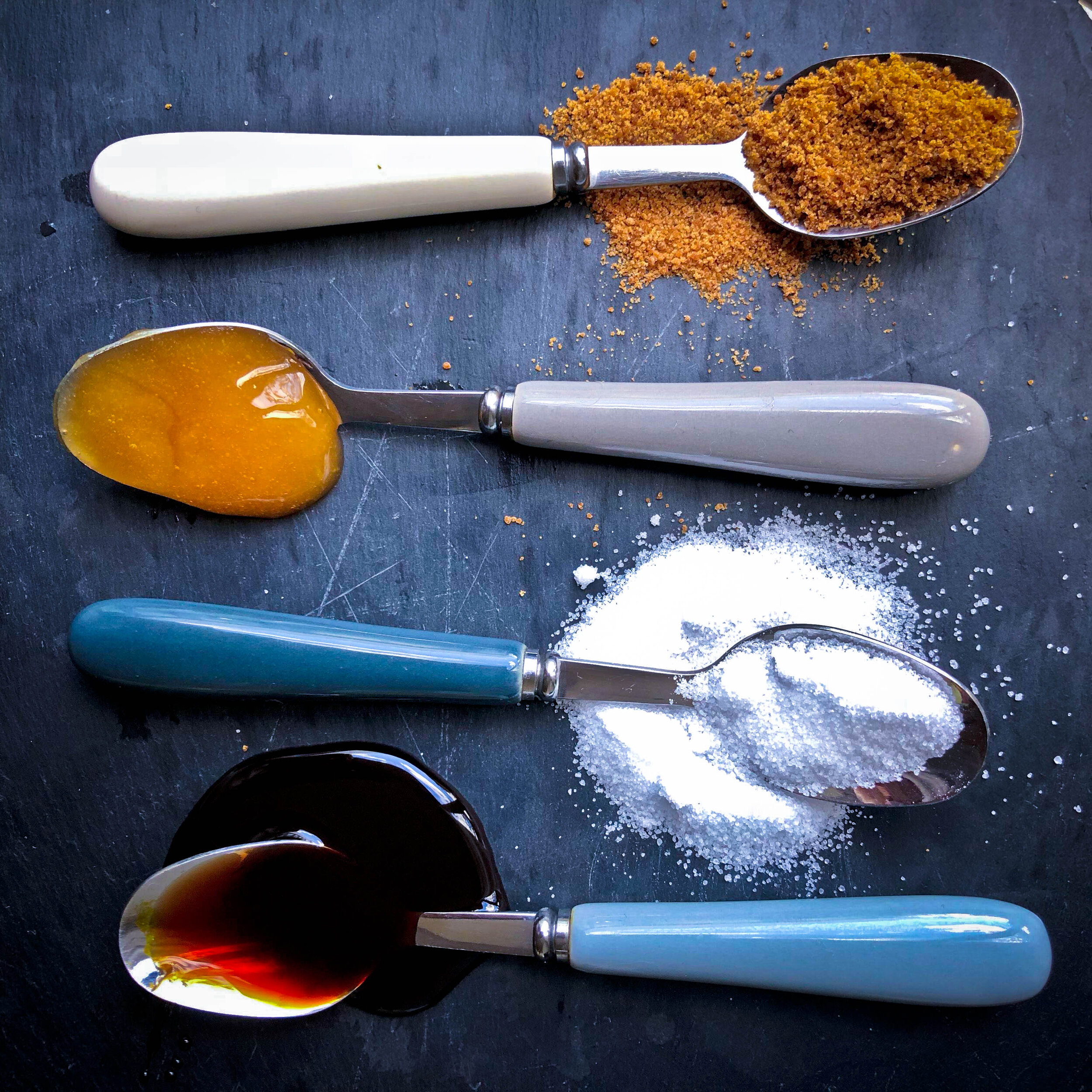Debunking Sugar Myths!
Confused? You’re not alone!
Added sugars, natural sugars, refined sugars, unrefined sugars….the headlines provide a confusing minefield of mixed messages, so it’s no wonder that it is one of the most frequently discussed topics during my cooking classes!
To fully get to the bottom of sugars, we first need to start with a quick (or perhaps not-so-quick) science lesson so that we can understand what sugars are and what they do to our bodies. Sugar is a type of carbohydrate, and when digested, carbohydrates are broken down and then converted into glucose, which the body uses as energy. It fuels every single cell from the muscles, to the nervous system, and the brain. But as we already know, not all carbohydrates are created equal — Complex carbs (found, for example, in whole grains, veggies and legumes) release energy more slowly into the body and helps us feel full for longer, thanks to, in part, their high fibre content. On the other hand, simple carbohydrates, (such as white bread, white rice, fizzy drinks and added sugar) are released into the blood stream very quickly, which creates a rapid rise in blood sugar (sometimes triggering feelings of anxiety) followed by a rapid drop in blood sugar (which can cause fatigue and hunger). These fluctuations cause cravings, inconsistent energy levels and may cause weight gain or serious conditions such as diabetes. So as a general rule of thumb, the less added sugars we consume (no matter what the source), the better.
Chocolate & Black Bean Bars Sweetened with Dried Apricots
Right, so now we know what sugars are and what they do to our bodies, but there is still the nagging confusing issue of natural sugars vs refined sugars vs unrefined sugars. In general, it is often safe to assume that the less processing a food has undergone the better it is for you. For example, if a grain of wheat has been de-husked, washed, bleached and treated to form a white powder, it is no longer a complex carbohydrate. Over processed foods are stripped of their nutritional value including their fibre, which the body needs for gut health and efficient digestion. And the same principal applies when we are talking about sugars. Refined sugars are extremely processed, in addition to possibly containing harmful chemicals and don’t offer any nutritional value whatsoever.
On the other end of the scale — a banana is not just an empty pile of fructose. It is packaged up with a host of nutrients, vitamins, antioxidants and fibre, and it’s this fibre which slows down the absorption of sugars in your blood stream and helps stabilize blood sugar levels. That’s one of the reasons why it’s important to eat the skin of the jacket potato, and not just the soft middle. The skin contains most of the fibre and this helps release energy more slowly instead of creating a blood sugar spike.
Sweet Potato Chocolate Chip Cookies sweetened with Dates & Bananas.
For this reason, in an ideal world, it’s best to sweeten our food with natural sugars, as they are packaged up with all of the nutrient goodness too! For example, did you know that eating 3 dates actually constitutes as one of your five a day? So it would be great to sweeten your treats with dried dates or apricots. Either by chopping them up and adding them to the batter, or else you can soak them in warm water and whizz them up in a blender to create a date paste to add to cookies. Talking of which, head over to my “Sweets” section to see lots of desserts and sweet snacks only naturally sweetened liked the ones in the photos here. Other recommendations for natural sugar substitutes: Use real fruit to sweeten dishes as much as possible, such as ripe bananas, applesauce or pumpkin puree in baking, or adding dried or fresh fruit on top of cereal and yoghurt. This form of sugar contains fibre, thereby slowing the release of sugar into the blood when consumed. It might also be worth adding spices like cinnamon and nutmeg to enhance the natural sweetness of your food.
But if it’s the hard stuff that you really need then just bare in mind that the NHS currently recommends that added sugar should not make up more than 5% of our daily caloric intake. This is about 30g a day for an adult, 24g per day for kids between 7–10 and 19g per day for those between 4–6 years old. It’s definitely worth noting, that natural sugars found in milk, fruit and vegetables doesn’t count as ADDED sugars — and we don’t need to cut down on these!
The reason unrefined sugars, like honey and maple syrup, have become so popular nowadays is because they contain trace minerals (like calcium, iron & magnesium) which sounds like a great thing and a healthy option. But the levels of minerals in these products are so low that they do not contribute a significant amount to your diet, especially since you shouldn’t be consuming large amounts of added sweeteners in the first place. It’s definitely worth noting, that the less refined and processed a food is in general, no matter what it is, has got to be a good thing! But in terms of how your body actually reacts to the sugar in your blood stream, it is exactly the same way whether the source is unrefined coconut sugar or refined white sugar. Other common sources of unrefined sugar are agave nectar, brown rice syrup, coconut sugar, date syrup and molasses.
Some food labels can be somewhat confusing and a tad deceptive if you’re not familiar with sugar lingo! So, here is a list of some commonly added sugars:
Agave Nectar
Barley Malt Syrup
Beet Sugar
Brown Rice Syrup
Brown Sugar
Cane Crystals (cane juice crystals)
Cane Sugar
Coconut Sugar or Coconut Palm Sugar
Corn sweetener
Corn syrup, or corn syrup solids
Dehydrated Cane Juice
Dextrin
Dextrose
Evaporated Cane Juice
Fructose
Fruit juice concentrate
Glucose
High-fructose corn syrup
Honey
Invert sugar
Lactose
Maltodextrin
Malt syrup
Maltose
Maple syrup
Molasses
Palm Sugar
Raw sugar
Rice Syrup
Saccharose
Sucrose
Syrup
Treacle
Turbinado Sugar
Xylose



